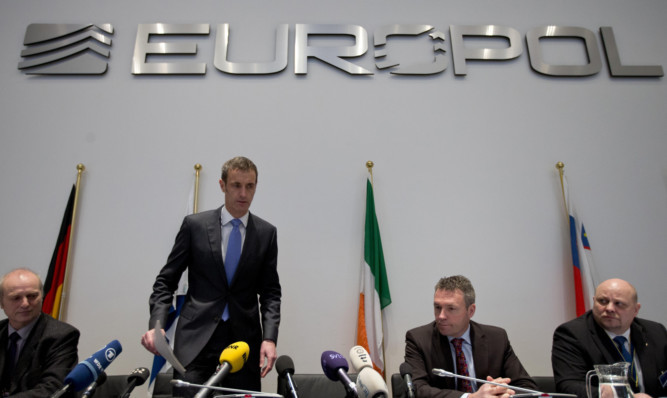A football match-fixing investigation has uncovered more than 680 suspicious games, including World Cup and European Championship qualifiers and two Champions League matches, police have said.
One of the Champions League games under investigation is said to have been played in England.
The probe also found evidence that a Singapore-based crime group is closely involved in match-fixing.
The investigation by Europol, the European Union’s joint police body, found 380 suspicious matches in Europe and another 300 questionable games outside the continent, mainly in Africa, Asia, South and Central America.
“This is a sad day for European football,” Rob Wainwright, the head of Europol, said. He said criminals were cashing in on soccer corruption “on a scale and in a way that threatens the very fabric of the game.”
Europol refused to name suspects, players, clubs, or officials involved to avoid prejudicing investigations, and it was unclear exactly how many of the matches mentioned were previously known to have been tainted.
It uncovered 8 million euros (£6.9 million) in betting profits and 2 million euros (£1.7 million) in bribes to players and officials and has already led to several prosecutions.
Those numbers are far lower than many estimates of the amount of cash involved in match-fixing and betting on rigged matches, but prosecutors said they are what they can directly pin down through paper trails, phone records and computer records.
“This is the tip of the iceberg,” said Friedhelm Althans, a German investigator.
Europol investigators analysed 13,000 emails and other evidence and identified 425 players, criminals, match officials and club staff suspected of being involved in manipulating matches dating back several years.
Mr Wainwright said the involvement of organised crime “highlights a big problem for the integrity of football in Europe.”
He said a Singapore-based criminal network was involved in the match-fixing, spending up to 100,000 euros (£86,000) per match to bribe players and officials.
He said while many fixed matches were already known from trials in Europe, the Europol investigation that began in July 2011 lifted the lid on the widespread involvement or organised crime in rigging games.
“This is the first time we have established substantial evidence that organised crime is now operating in the world of football,” he said.
The global nature of the organised crime syndicates involved makes them hard to track down and prosecute. Europol said a single fixed match can involve up to 50 suspects in 10 different countries.
Europol said in a statement the criminal group behind most of the match-fixing was placing bets mainly in Asia.
“The ringleaders are of Asian origin, working closely together with European facilitators,” the organisation said, but it added that “Russian-speaking” and other criminal gangs were involved .
Mr Wainwright said the international soccer community now needed a “concerted effort” to tackle the corruption. He said he would be sending the results of the investigation to UEFA President Michel Platini.
Previous investigations have found that a World Cup qualifier between Liechtenstein and Finland in September 2009 was fixed, as was the European Championship qualifier between Norway and Malta in June 2007.
